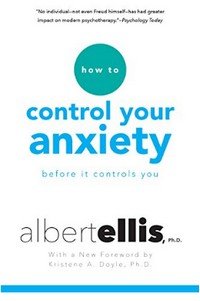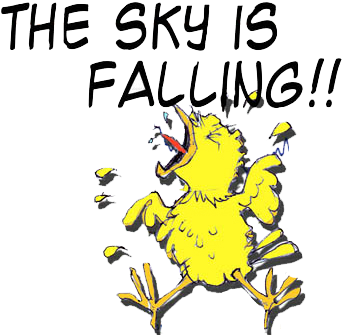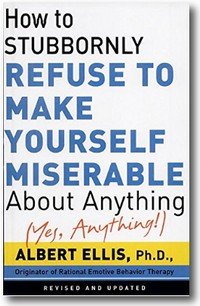It’s official! “Awfulize” is now a word!
|
|
Most of us familiar with REBT-CBT are familiar with the concept of “awfulizing” or “catastrophizing,” meaning to interpret an event as 100% bad. We can make a strong rational case that no matter how bad an event, it can never prove to be 100% awful, it can never be absolutely the worst it can get. However, that may seem like little more than a semantic game, little consolation if you find yourself being tortured, but realize you could always be tortured more diabolically! Still, it is true. Think about it. No matter how bad things get, they can always get worse, and therefore are not, by definition, awful, horrible, terrible, the worst!
However, let’s leave that to the sophomores to sort out during one of their late night session over stale pretzels and flat beer.
There are two much more immediate and practical problems with “awfulizing” that most of us can relate to.
The first is that we needlessly upset ourselves by incorrectly interpreting and labeling routine hassles (getting stuck in traffic, getting a dirty look from the girl at Starbucks, arriving at the dry cleaners five minutes until closing time to find that it has already closed. And so on . . . ) as HORRORS. A bummer, a hassle , a pain in the ass, annoying, irritating, concerning . . . Yes! Awful, terrible, the worst? No! This is not dry, intellectual semantics. This is practical, juicy and hot semantics, emotionally speaking. However, to appreciate this, you have to do the work. The next time you find yourself using this inflammatory language to describe a routine hassle, notice how that makes you feel. Notice how it tends to magnify your level of anger and frustration. Do you like that? Do you think it is helpful in any way? Do you believe it is an effective strategy for managing life’s little challenges? Do you imagine it in any way can assist you to get more of what you want and less of what you do not want? Well, obviously, it is an unnecessary emotional inflammation without any benefit.
 |
 |
 |
 |
But, wait! There’s more! Not only does it not provide any benefit, but see how you have “magically” given yourself a double-whammy! You have the original hassle and now you are upset over something that there probably isn’t a damn thing you can do anything to change! Congratulations!
Secondly, probably more significant and problematic than the “awful” is the “izing,” the izing on the cake, as it were. Remember, REBT is more effective and makes more sense if we try to think about these issues as dynamic processes rather than situations or states or conditions. Try to think of them as verbs rather than nouns. So, then, “izing” suggests a repetitive or a circular process of returning to the memory of the event over and over and reminding ourselves how truly awful things really are! And returning and returning and returning, thus inflaming and inflaming and inflaming. This process is unfortunately the “default setting” for some people who use this “trick” keep themselves habitually agitated and upset more or less on an ongoing basis. In other words, it is not just having an emotional response to something, getting over and done with it, and then getting on with life’s business. It is a perverse urge to keep stirring the pot, as it were.
But, as I said, it can, and often does get worse! If we add to our lament of how terrible and awful the thing some demands such as “This MUST not be happening”, etc. it can and does get a lot worse!
| None other than Raymond DiGiuseppe recently commented on facebook, something to the effect, that this awfulizing business may not be a compassionate or helpful approach to severe trauma such as when a parent learns her child has cancer. True enough. However, if we dwell too long on the outer fringes of the argument, we risk losing the importance of this principle. Whatever happens, happens. And that can be very unfortunate indeed. However, there is nothing that happens that we cannot make worse by awfulizing over it. |
So, what on earth do we do? What can we do?
  |
 |
 |
 |
 |
 |
 |
 |
You begin by getting with a good REBT coach and by reading some basic texts such as Dr. Ellis’s “A Guide to Rational Living.”
Finally, something practical and powerful you can take away from this article (if you use it).
The next time you notice yourself awfulizing, especially over something relatively trivial, thoughtfully, persuasively, convincingly remind yourself
1. This is a hassle, nor a horror!
2. This is a bummer, for sure, but it is not the end of the world! Not hardly!
3. Although I strongly prefer such things not happen, where is it written that they absolutely must not and will not happen?
Please try this and let us know what happened and how it worked. Your participating is the lifeblood of REBT Info. If you need help or have any questions, just ask!
~Rex
Rex@REBTinfo.com
![]()
Originally posted 2017-11-20 06:28:54.
- Is “indifference” a better option than “strong preference”? - Wed 25 Feb 26
- New REBT Info facebook group - Tue 24 Feb 26
- Beat the Holiday Bloat - Tue 24 Feb 26




